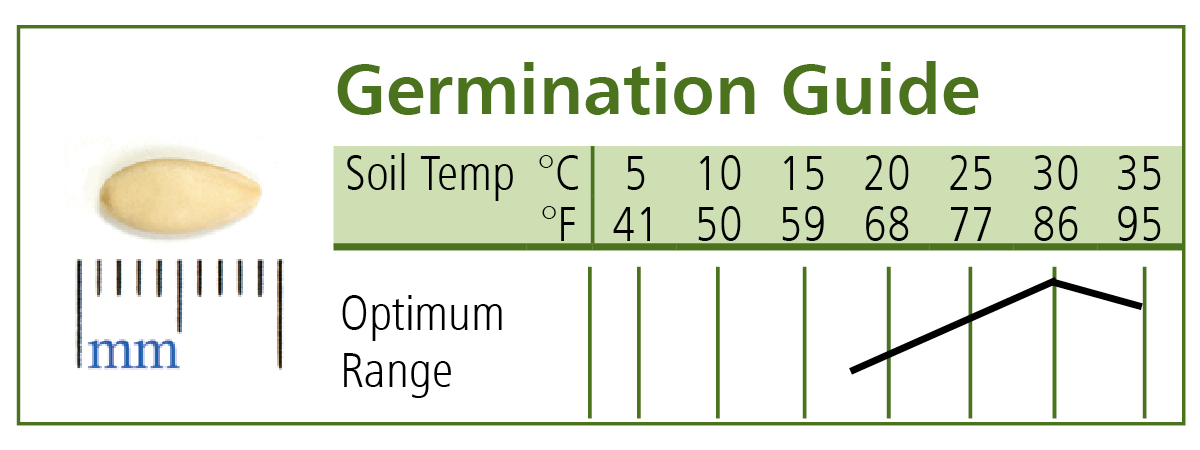Quirk
(F1) Cucumber Seed
Product ID: 3408
Unique mini cucumber for snacking and pickling.
Quirk is an attention-grabbing mini with a striking contrast between bright green and gleaming white. Short vines produce heavy yields of tasty 2–3" fruits. Performs well in the greenhouse or unpruned, in the field. A good field cucumber because it resists beetle damage very well. Daily harvest is recommended. Gynoecious and parthenocarpic. Intermediate resistance to powdery mildew and cucumber mosaic virus. NOTE: When growing indoors, we recommend Quirk be trained on Hortonova trellis with multiple leaders. Pruning to a single leader will reduce yield potential, and typical long-vine cucumbers may shade out Quirk if grown too close. Avg. 18,000 seeds/lb. Mini: 10 seeds. Packet: 30 seeds.
https://www.johnnyseeds.com/vegetables/cucumbers/specialty-cucumbers/quirk-f1-cucumber-seed-3408.10.html
Size
Price
Quantity
Availability
1,000 Seeds
$1,200.15
Estimated Availability Aug 29, 2022
- This product does not ship outside the United States and Canada.
SCIENTIFIC NAME: Cucumis sativus (unless otherwise indicated)
CULTURE: Requires warm, well-drained soil high in fertility, with a pH of 6–6.8. Consistent, adequate irrigation is needed to produce an abundant crop. Cucumbers are very sensitive to cold. Make sure both soil and air temperatures have warmed prior to planting. Using plastic mulch and row covers will greatly enhance the vigor and potential yields of cucumbers by providing warmth and insect protection. For greenhouse or high tunnel production the use of gynoecious and parthenocarpic varieties is highly recommended.
TRANSPLANTING: Sow indoors in 50-cell plug trays, 1–2 seeds/cell, 3–4 weeks before transplanting. Keep temperature above 70°F (21°C) day and 60°F (16°C) night. Transplant 12" apart in rows 5–6' apart. Do not disturb roots when transplanting.
DIRECT SEEDING: Wait until soil is warm, at least 70°F (21°C). Cucumber seeds will not germinate at a soil temperature below 50°F (10°C). Sow 2 seeds/ft., 1/2" deep, in rows 6' apart. Thin to 12" apart.
DISEASES: Practice crop rotation, residue sanitation, and choose disease-resistant varieties. Control insect pests to prevent bacterial wilt.
INSECT PESTS: Exclude cucumber beetles with row covers at planting, or control with insecticides such as pyrethrin or azadirachtin.
HARVEST: Once fruit bearing begins, pick daily.
STORAGE: Hold cucumbers at 45–50°F (7–10°C) and 90% relative humidity for up to 2 weeks.
NOTE: If seedless cucumbers cross-pollinate with seeded cucumbers, they will yield seeded fruits. Generally, seedless types are grown separately in greenhouses or hoophouses with insect screens installed to prevent cross-pollination of seeded and seedless varieties.
DAYS TO MATURITY: From direct seeding; subtract about 10 days if transplanting.
AVG. DIRECT SEEDING RATE: 30 seeds/15', 100 seeds/50', 250 seeds/125', 500 seeds/250', 1,000 seeds/500', 15M/acre at 2 seeds/ft. in rows 6' apart.
TRANSPLANTS: Avg. 85 plants/100 seeds.
SEED SPECS: SEEDS/LB.: Avg. 20,200.
PACKET: 30 seeds, unless otherwise noted.
CULTURE: Requires warm, well-drained soil high in fertility, with a pH of 6–6.8. Consistent, adequate irrigation is needed to produce an abundant crop. Cucumbers are very sensitive to cold. Make sure both soil and air temperatures have warmed prior to planting. Using plastic mulch and row covers will greatly enhance the vigor and potential yields of cucumbers by providing warmth and insect protection. For greenhouse or high tunnel production the use of gynoecious and parthenocarpic varieties is highly recommended.
TRANSPLANTING: Sow indoors in 50-cell plug trays, 1–2 seeds/cell, 3–4 weeks before transplanting. Keep temperature above 70°F (21°C) day and 60°F (16°C) night. Transplant 12" apart in rows 5–6' apart. Do not disturb roots when transplanting.
DIRECT SEEDING: Wait until soil is warm, at least 70°F (21°C). Cucumber seeds will not germinate at a soil temperature below 50°F (10°C). Sow 2 seeds/ft., 1/2" deep, in rows 6' apart. Thin to 12" apart.
DISEASES: Practice crop rotation, residue sanitation, and choose disease-resistant varieties. Control insect pests to prevent bacterial wilt.
INSECT PESTS: Exclude cucumber beetles with row covers at planting, or control with insecticides such as pyrethrin or azadirachtin.
HARVEST: Once fruit bearing begins, pick daily.
STORAGE: Hold cucumbers at 45–50°F (7–10°C) and 90% relative humidity for up to 2 weeks.
NOTE: If seedless cucumbers cross-pollinate with seeded cucumbers, they will yield seeded fruits. Generally, seedless types are grown separately in greenhouses or hoophouses with insect screens installed to prevent cross-pollination of seeded and seedless varieties.
DAYS TO MATURITY: From direct seeding; subtract about 10 days if transplanting.
AVG. DIRECT SEEDING RATE: 30 seeds/15', 100 seeds/50', 250 seeds/125', 500 seeds/250', 1,000 seeds/500', 15M/acre at 2 seeds/ft. in rows 6' apart.
TRANSPLANTS: Avg. 85 plants/100 seeds.
SEED SPECS: SEEDS/LB.: Avg. 20,200.
PACKET: 30 seeds, unless otherwise noted.
Johnny's is committed to your success, every step of the way.
We want you, our customer, to be 100% satisfied with all of our seeds, tools, and supplies.
If anything you purchase from us proves unsatisfactory, we will either replace the item or refund the purchase price.







